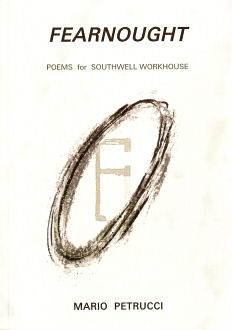Fearnought (Poems for Southwell Workhouse) by Mario Petrucci

|
"Of the many workhouses built in the nineteenth century, none survives in better condition than that at Southwell in Nottinghamshire. This book, designed and produced by Mario Petrucci between 2004 and 2006, is the poet's direct response to the Workhouse, its architecture, and the people who lived, worked and died there. Through this unique residency, poems were placed within the house, together with an activity sheet for families, schools and writers. These resources offer fresh impetus to the realisation that the study of workhouses through literature is invaluable in understanding how society treats its poor." Fearnought by Mario Petrucci was published in 2006 by the National Trust at £6.95. ISBN: 1-84359-251-7. More information... |
This is a beautiful book — both in content and production. The poems are a sensory delight and evoke all the sights and sounds, textures, tastes and smells of life in the Southwell workhouse. The book itself is also a pleasure to read, very nicely printed, with atmospheric pictures of the workhouse building complementing the text.
Mario has very kindly allowed a couple of the poems to be included here. First, for younger readers, a new take on the old children's rhyme, inspired by the discovery that at Huddersfield workhouse in the 1860s, children sometimes slept ten to a bed!
ROLL OVER!There were ten in the bed
and the little one said —Roll over! Roll over!
So they all rolled overand he fell out.
Now, an almost Zen-like contemplation of one of the labour tasks often given to able-bodied male inmates — stone-breaking.
STONE-BREAKERThis ain't no show of force.
Men more muscled than I-isgets trapped in their blows.
See? It's all in the weight an'sweep of the sledge. How
you lets the silvery head findher own sweet way to that
crack. When she goes likethat — so neat you feels it
in your blood — it's akin tojoy to watch them melons
split. 'Cause you knowseven stone more dirty an'
cheap than you-is can rockisself to sleep in its halves
clean as two moons — twomoons made of lime.
Unless otherwise indicated, this page () is copyright Peter Higginbotham. Contents may not be reproduced without permission.


